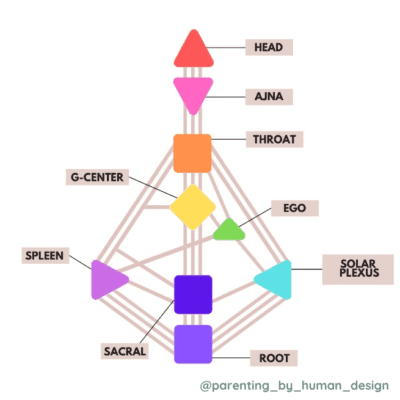What is Human Design Parenting? When you’re a parent, there are so many things to worry about. You want your child to grow up happy and healthy. You also want them to have the best chance at success in life. You want them to be good people, you want them to have the best experiences, relationships, interactions…
But the information out there can be overwhelming and often a one size fits all approach – which completely ignores the fact that each and every one of us is unique. So having a way of honouring our children as the individuals they are, is not something we hear a lot about…
This is how I felt until I learnt more about gentle parenting, which invites parents to embrace life’s journey with their kids as a curiosity-fuelled adventure (instead of the old school way of ‘I’m your parent, and I know better’ kinda thinking).
But still, I was missing the ‘how’ – how to actually embody this form of parenting on a day-to-day basis.
And then I discovered Human Design and things started to change, for the better.
Human Design parents get curious about how they raise their kids, which often leads to a happier family dynamic (although it’s always a work in progress!) and children who grow up being able to live in their truth, prepared for adulthood, aware of their emotions and tendencies, without being overly burdened with generational patterns. (I fully realise this is a huge generalisation, I share here only my own experiences and perspectives).
I’m sharing my perspectives on gentle parenting and human design parenting – while I am also living it with my own little family – so that you can make an informed decision when it comes time for you as a parent to choose what’s best for your family! I emphasise ‘my’ perspective, because while I’m an advocate of what I talk about here, I am not saying there is only one way to happy families (if that even exists all the time!). It’s on us to figure out what suits us, our individual needs and our own family situation.
But if you’re curious, read on…

What is Human Design and the Human Design System?
Human design – known as the science of differentiation – is a modality, or a life strategy that can help you to live your best life by understanding what the heck you are even doing here on planet earth in first place.
So many of us have this burning question to answer “What’s my purpose here?” And Human Design goes a long way to helping you discover that…
It’s based on the idea that human beings are perfectly designed for thriving in their environment and leading fulfilling lives. But from birth, and with the natural conditioning that comes with the human experience, living in a society and a culture that values certain things (like being ‘good’, not being ‘too loud’ or having to follow the rules, however outdated they are), we lose that natural, inherent knowledge. And once you unpeel the layers of conditioning, what’s left is your true self.
The Human Design System (HDS) is a combination of several modalities, including:
The iChing
The Kabbalah
Chakra system
Astrology
Think of it like a personality test for your soul (and one that you can’t cheat on because it’s based purely on birth data!)
These modalities combine to form the human design chart which is a map of an individual’s essence and destiny, providing insights into personality traits, strengths and challenges, life purpose and more! (You can look up your chart for free here, just be sure you have the right birth time, as this is a vital piece of the chart – even being wrong by an hour can change your results).
Linking Human Design to gentle parenting…
What Is Gentle Parenting?
Gentle parenting is a way of raising children that focuses on developing connected, respectful relationships with your child. It does not mean having no boundaries or letting your kids do whatever they want, contrary to popular belief!
I go into more detail here about how gentle parenting has helped me and my family.
In essence, gentle parenting is about:
- Respecting your child as a whole being, instead of assuming they are just a small, incomplete version of yourself.
- Finding out what they like to do and encouraging them in that activity (without adding your preconceived judgements or desires for what you want them to be doing).
- Setting appropriate boundaries, limits or consequences for their behaviour (without overreacting).
- Displaying empathy and understanding for their feelings, no matter how unreasonable or embarrassing they might seem to you.
- Avoiding negative or judgmental ‘shaming’ language.
- Showing compassion, empathy and respect and embodying those traits as a parent and role model.

(If this sounds like a lot, it kind of is! But the role of parenting is often made even harder when we try to impose our own way of being onto our kids, instead of letting them be. In my Human Design coaching we work through exactly how to make things easier and ultimately more enjoyable when we live by our design….)
Where Human Design and Gentle Parenting Meet
For me, Human Design is an integral part of our gentle parenting approach.
It teaches the idea that we are all made up of different energy types (or systems) and to understand how our own type affects and interacts with those around us. It also alerts us about what can trigger a child’s “reactive” tendencies so you can gain a better understanding of their reactions. Even in the same family siblings will react in different ways because they are inherently different. Learn here about my own children’s charts and how they differ – one daughter is a projector, while the other is a reflector.
Human Design teaches that we are all different and as such, our children will be too.
Human design parenting is rooted in the idea of letting your child be who they came on this planet to be. Rather than trying to change them into something they’re not or forcing a certain behaviour from them, you simply give love (energy) back to them.
Getting Started with Human Design Parenting
If you’re new to human design parenting, this is a great place to start!
- Know your own Human Design chart, and that of your spouse/partner/co-parent.
- Know your children’s Human Design charts.
- Have a proper reading by someone trained to read Human Design charts. There is of course a lot of free information out there, which can be a great start, but each human design chart is completely unique (you are about 1 in 3 billion!) so take the time to find a human design reader or coach (like me!) who can help you to understand the chart, the gates, the symbols etc.
Understanding Yours and Your Child’s Human Design Chart
Being aware of and understanding the conditioning you may have experienced in your life until now will form a really important piece of the pre-work I suggest clients do prior to having a reading done. This does not have to be a long, drawn out process (although for some this can be triggering to recall or become aware of things from our past that we may have pushed to one side), but here are some questions you might ask yourself or journal about:
- What conditioning / beliefs / patterns do you believe you have inherited from your family of origin and how are they serving you today? These can be good/bad, helpful/not helpful. Don’t overthink it, just journal and see what comes up.
- How were you celebrated / revered as a child? Was it for specific achievements or behaviours? How has that followed through into adulthood? Do you still seek the same kind of celebration now?
- What are some specific challenges / issues that you would like to know if human design can help you with?
When I work with clients on their human design chart, even if they want to focus on their children’s charts, I always suggest we start with these questions for themselves and their own chart, because it offers many insights into how they might be perpetuating certain behaviours in their own parenting.

Understanding More About Your Child’s Human Design
I’ve included here some very general information about each human design ‘type’. But please note, these are generics. And there is no good or bad design to have! Only when you have a personalised reading of your chart can you start to understand the intricacies of us all as human beings.
You may also read each of these human design types and think they all apply to all children, and that can be true in some cases – kids will be kids after all, right? But once you delve deeper into the types, and you start to learn about specific people in your life and what their human design chart says, you will likely start to notice they do indeed carry specific traits.
Manifestor Children
Manifestor children are often quite independent, and want to do things by themselves. They are very in tune with their environment and have an intuitive knowing about what is needed for any given situation. Manifestor children will often move around a lot, especially if they find the current circumstance boring or uninteresting.
They are often the big energies, the whirlwinds of the children’s group and many adult manifestors were told that they were too big (energy wise), too loud, too forthright, too opinionated when they were younger.
They have a wonderful sense of doing what’s needed by being able to skip ahead and miss out steps that other kids need to follow. They might just work a lot quicker or in different ways to others but often this is reprimanded for not following orders.
Conditioning for Manifestor Children
If you’re parenting a manifestor, here are some general tips and areas to be aware of:
- Let them express their opinion (phrases such as “children should be seen and not heard” will slowly kill a manifestor’s joy for life – they are literally here to share their insights)
- Embrace their big energy – let them express this in ways they feel most comfortable – they will likely be the clown of the group, or the life and soul of the party – let them be! And if they are not, that’s ok too – big energy does not always = loud and forthright.

Manifesting Generator Children
Manifesting Generators (Mani Gens) are a combination of the manifestor and the generator in human design.
Manifesting Generators are potent symbols of human potential. They represent the urge for creation and creativity that is inherent in all human beings. Manifesting generators embody our innate need to create something new out of what we already have or understand; they inspire us to take an idea and make it manifest into reality by taking action.
Mani Gens are the human interface to all that is. They represent our innate self-expression and creativity, as well as a bridge between dimensions of space and time: past, present and future.
The Manifesting Generator symbolizes the power we have to manifest anything into reality by first seeking it within ourselves. They are also a combination of Manifestors and Generators, energies that work in tandem.
The Manifesting Generator is a powerful symbol that reminds us of the need to take action now, while also drawing from what we’ve learned about ourselves and life so far.
They are likely to change lanes quickly, quit before they finish, switch tactics and change their minds quickly.
Conditioning for Manifesting Generator Children
If you’re not already ok with it, start getting really comfortable with your child changing their mind, a lot!
For example, you might find that your mani-gen wants to start cricket lessons, and gets super excited about it but then quit after two classes. You might rush to remind them things like “quitting is bad” and “we signed up so finish the season, ok?” But this type of push back is not going to help your mani-gen child live by their design. Sure, it can be annoying to watch them constantly go from one thing to another, but instead of trying to dull their sense of passion for new things, try to manage it in a way that allows them to experience a variety of activities – like a multi-lesson gym or sports membership, rather than just one type of sport.
Embrace their beautiful sense of moving ahead and moving quickly – they are here to move humanity forward by showing us new and better ways to do things. Don’t slow them down with how things ‘should’ be done – because who is to say that the way we’ve always done it is in fact the best?
Generator Children
If your child is a generator then likely you have a naturally energetic child who is always on the move. They are very sensitive to changes in their environment, sometimes reacting with fear or anger when they don’t understand what is occurring.
Generator children dislike being confined or restrained for long periods of time and a lack of physical activity can result in restlessness at night and poor sleep.
Generator children will often stay obsessively focussed on one thing for long periods of time. Traditional schooling does not always allow for this constant switch and change of pace so look at ways you can accommodate this if you see it as an issue for your generator child.
They love to be seen for their achievements and accomplishments and because they have a consistent and sustainable source of their own energy they can often start something and insist on finishing it, even if others have moved on.
Conditioning for Generator Children
Generator children are often deeply concerned about living up to their potential and may feel the need for constant acknowledgement. They have an innate sense of what needs to be done, a strong desire to maintain order in their environment, and they work hard at achieving goals set by others; when these goals don’t align with theirs then frustration can set in. Frustration is the ‘not-self’ theme for generators.
The challenges for generator children in the home environment are that they have a strong need to be busy and often don’t enjoy being told what to do. They can become frustrated when faced with tasks which are too easy, or if there is an absence of stimulation. When not given appropriate constructive outlets, generators tend to either become mischievious or withdrawn.
The challenges for generator parents are that they may find themselves on the receiving end of their children’s frustration. They can work to set achievable goals and offer constructive outlets, aiming to raise self-directed independent thinkers in a balanced way.
Generators have an amazing ability to create their own reality with the help of what is already available in the world around them; they find that there is always plenty more for them.
Projector Children
If your child is a projector, it is likely that they are constantly looking for new information and ideas from the world around them. They tend to be curious, energetic and have a creative flair in their work or projects.
Projectors (adults and children) are often labelled as lazy, dreamy or irresponsible as they might not be focused on just one thing at a time. The fact is that they do not have a defined energy centre so they generally work best in bursts of 3-5 hours (maybe less so for younger children).
You may find (like I do with my projector child) that they are very interested in others – they quickly form and lead groups or projects and when they see a need for leadership (in the park or playground) they are the ones to jump in, regardless of age or experience! Whilst this might seem bold and confident, if they are not accepted or their ideas are not required, they can be labelled as bossy and start to question their own value.
Conditioning for Projector Children
If you have a projector child, it is important to support their ability to explore and find what they are passionate about. There is no need for them to follow the same patterns as others; creativity doesn’t work like that.
What projectors might struggle with more than anything else is new routines or tasks which take up time but don’t seem to provide any value.
Projectors can get easily overwhelmed by the world around them and may benefit from having some gentle boundaries set for them in order to make sure that their natural creativity is channeled effectively.
Projectors are here to be guides and have an incredible ability to see what needs to be done, despite their age or perceived lack of wisdom / experience. Through conditioning, the projector child may believe they are bossy or too assertive.
The key for the human design parent is to stay true to their own self and not be afraid of what others might think about them. In this way, they will always know how best to take care of themselves and their children – and that’s really all we can hope for as human beings!

Reflector Children
If you’re parenting a reflector (as I am) then please know you have a rare child! Approximately only 1% of the population is a reflector.
The unique thing about reflectors is that they have no defined energy centres at all – they are literally like a mirror to the society, people and experiences around them
Reflectors are like human sponges, soaking up everything they experience with their senses. They love exploring what’s happening around them and experiencing the world, but also need to live in a space that feels safe. Their environment and the people in it are key.
Reflectors are often called “experience-driven” children. They learn through experience and everything is about their own personal perception of the events they’re witnessing or taking part in
Conditioning for Reflector Children
Reflectors tend to be very sensitive and you might even find that something other children take as normal and not stressful, such as eating with friends at school or daycare, might be extremely stressful for a reflector child – because they are absorbing the energy of everyone around them.
There are a lot of ways to help reflectors feel more comfortable. Some might prefer eating at home, or even just with their parents alone in the kitchen; some may like listening to music while they eat so that it feels less overwhelming and distracting; others may want to take part only if they can have a “safe person” sitting next to them. Honour your child’s needs, however inconvenient or embarrassing it might seem.
Human Design Parenting: Bringing It All Together
If you are looking into Human Design for yourself and your child, I feel a big warning needs to be made here. A lot of what you might uncover – patterns, conditioning, traits from your own childhood might spill over to your own way of parenting. Sometimes these are good of course – patterns that have helped to shape who we are in a good way (e.g. being a thoughtful member of our community as learnt from your mother’s volunteer work) might have been inherited from our family of origin. However, so many of us also face unhelpful, negative patterns emerging in our adult life – and much of this could be traced back to how we were raised.
Please note that this is normal. We all face conditioning in some way (the good and the bad), this is just part of the human experience. But depending on what other inner work you might have done, when you start delving into patterns and behaviours in human design you might feel triggered by certain things. If that is the case, then consider seeking professional help in the form of your GP, a psychologist, therapist etc.
The human design is a map of the patterns, behaviours and emotions we all carry with us. It’s been said that it can also be seen as an inner blueprint for how to interact in life – if you know what your pattern is then you can understand where your behaviour might come from or why things happen around you. So when parenting we might be faced with certain challenges that require us to know what pattern we are dealing with.
It is very important to work with the design as well. The human body did not evolve overnight, and our lives have become increasingly fast-paced and busy since we were born; it should be no surprise that this affects how we parent, too.
Ready to add Human Design to your parenting toolkit?
Keen to dive deeper?










0 Comments
Trackbacks/Pingbacks